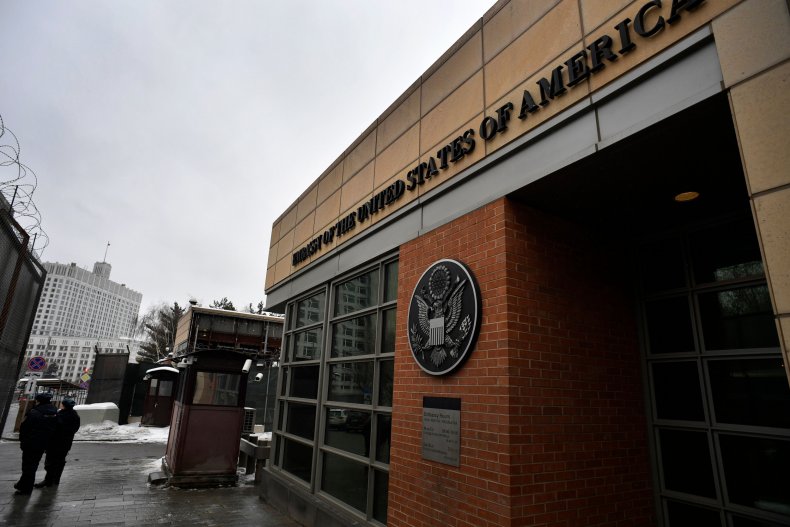[ad_1]
Russia has accused the U.S. of starting a “visa war” with Moscow, resulting in severe staff shortages at the only remaining American diplomatic mission in the country as President-Elect Joe Biden prepares to take office and officials continue to investigate the SolarWinds hack.
The Russian embassy in Washington, D.C., issued a statement on its Facebook page Saturday disputing media reports in the U.S. blaming the Kremlin for staffing issues at the American embassy in Moscow.
One report in The Washington Post said the situation was so dire that senior American diplomats had to carry out day-to-day tasks like shoveling snow and handling disinfectants. The Moscow embassy is the last American diplomatic facility in the country following last week’s decision to close the consulates in Yekaterinburg and Vladivostok.
The Russian embassy in Moscow, however, said the U.S. is to blame for the situation. “We would like to remind once again that the responsibility for this ‘stalemate’ lies entirely with the American side,” the embassy wrote on its Facebook page.
“It was the United States that became the initiator of the so-called ‘visa war’, imposing the practice of personal visa exchanges, when employees of Russian foreign missions receive entry permits only in conjunction with the issuance of visas for American staff,” the embassy said.
Friday’s Post article, the embassy alleged, “mislead their readers and seek to place all the blame for problems related to consular and visa matters on the Russian side.”
“The information contained in the article does not correspond to the real state of affairs,” the Russian embassy added. “There were no refusals to issue visas to diplomats and other specialists employed by the U.S. missions. We don’t have any advantages here.”
“We act strictly on the basis of reciprocity. The number of visas we issue to American officials corresponds to the number of visas received by Russian employees in the United States.”
The embassy said Moscow had repeatedly called on the U.S. “to fully normalize our relations in terms of consular and visa issues.” It added: “There is no need to put your brand on the wrong steer. The ball is on the American side.”
The State Department confirmed last week it would close the Yekaterinburg and Vladivostok consulates, which a spokesperson told NPR would “optimize the work of the U.S. mission in Russia.” Secretary of State Mike Pompeo consulted with Ambassador John Sullivan before taking the decision.
The spokesperson said the closures are part of America’s “ongoing efforts to ensure the safe and secure operation of the U.S. diplomatic mission in the Russian Federation.” The spokesperson added: “The resulting realignment of personnel at U.S. Embassy Moscow will allow us to advance our foreign policy interests in Russia in the most effective and safe manner possible.”
The State Department had already temporarily suspended operations in Vladivostok and scaled back services in Yekaterinburg in March, amid the coronavirus pandemic and concerns over the health of staff.
Former diplomats have pushed back on the decision to close the consulates, warning that smaller American presence in Russia will hamper Washington’s ability to build ties with the Russia government beyond President Vladimir Putin and his immediate team at the Kremlin.
James Collins, a former U.S. ambassador to Russia who oversaw the opening of the consulate in Vladivostok in 1992, told the Post: “I cannot understand how this is anything but against the interests of the United States.”
Mike McFaul, a U.S. ambassador to Russia under President Barack Obama, described the closures as “a self-inflicted wound… Russia is not kicking us out. We are unilaterally deciding we don’t want be there. It’s a giant mistake. I hope Biden reverses it.”
Biden is expected to take a tough line on Russia when he takes power next month, breaking with President Donald Trump’s consistent defense of Putin. Russian officials are wary, and have said they expect no sudden thaw in relations between the Kremlin and the White House.
Kremlin spokesperson Dmitry Peskov told reporters Wednesday Moscow was expecting “nothing positive” from the new administration.
Deputy Foreign Minister Sergei Ryabkov told Interfax: “We are definitely not expecting anything good…And it would be strange to expect good things from people, many of whom made their careers on Russophobia and throwing mud at my country.”
Relations will be even more fractious given the recent SolarWinds hack, which officials have blamed on Russia even though Trump accused China of possible involvement. Hackers gained access to multiple federal agencies and were able to snoop on sensitive internal communications for months. Russia has denied involvement in the attack.
The full extent of the hack is not yet known, but one unnamed official told the Associated Press: “This is looking like it’s the worst hacking case in the history of America…They got into everything.”

ALEXANDER NEMENOV/AFP via Getty Images/Getty
[ad_2]
Source link